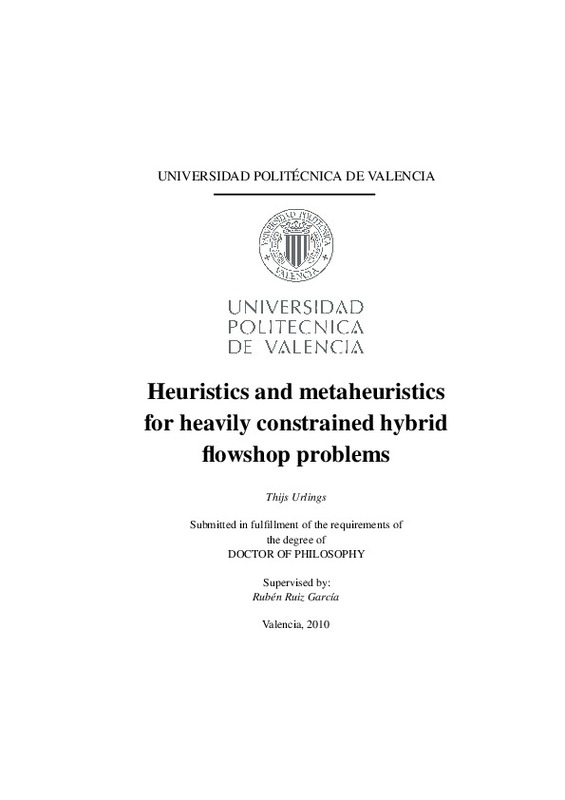- RiuNet repositorio UPV
- :
- Investigación
- :
- Tesis doctorales
- :
- Ver ítem
JavaScript is disabled for your browser. Some features of this site may not work without it.
Buscar en RiuNet
Listar
Mi cuenta
Estadísticas
Ayuda RiuNet
Admin. UPV
Heuristics and metaheuristics for heavily constrained hybrid flowshop problems
Mostrar el registro sencillo del ítem
Ficheros en el ítem
| dc.contributor.advisor | Ruiz García, Rubén
|
es_ES |
| dc.contributor.author | Urlings ., Thijs
|
es_ES |
| dc.date.accessioned | 2010-07-16T12:51:22Z | |
| dc.date.available | 2010-07-16T12:51:22Z | |
| dc.date.created | 2010-06-29T08:00:00Z | es_ES |
| dc.date.issued | 2010-07-16T12:51:16Z | es_ES |
| dc.identifier.uri | http://hdl.handle.net/10251/8439 | |
| dc.description.abstract | Due to the current trends in business as the necessity to have a large catalogue of products, orders that increase in frequency but not in size, globalisation and a market that is increasingly competitive, the production sector faces an ever harder economical environment. All this raises the need for production scheduling with maximum efficiency and effectiveness. The first scientific publications on production scheduling appeared more than half a century ago. However, many authors have recognised a gap between the literature and the industrial problems. Most of the research concentrates on optimisation problems that are actually a very simplified version of reality. This allows for the use of sophisticated approaches and guarantees in many cases that optimal solutions are obtained. Yet, the exclusion of real-world restrictions harms the applicability of those methods. What the industry needs are systems for optimised production scheduling that adjust exactly to the conditions in the production plant and that generates good solutions in very little time. This is exactly the objective in this thesis, that is, to treat more realistic scheduling problems and to help closing the gap between the literature and practice. The considered scheduling problem is called the hybrid flowshop problem, which consists in a set of jobs that flow through a number of production stages. At each of the stages, one of the machines that belong to the stage is visited. A series of restriction is considered that include the possibility to skip stages, non-eligible machines, precedence constraints, positive and negative time lags and sequence dependent setup times. In the literature, such a large number of restrictions has not been considered simultaneously before. Briefly, in this thesis a very realistic production scheduling problem is studied. Various optimisation methods are presented for the described scheduling problem. A mixed integer programming model is proposed, in order to obtai | es_ES |
| dc.language | Inglés | es_ES |
| dc.publisher | Universitat Politècnica de València | es_ES |
| dc.rights | Reserva de todos los derechos | es_ES |
| dc.source | Riunet | |
| dc.subject | Scheduling | es_ES |
| dc.subject | Hybrid flowshop | es_ES |
| dc.subject | Metaheuristics | es_ES |
| dc.subject | Realistic | es_ES |
| dc.subject | Optimisation | es_ES |
| dc.subject.classification | ESTADISTICA E INVESTIGACION OPERATIVA | es_ES |
| dc.title | Heuristics and metaheuristics for heavily constrained hybrid flowshop problems | |
| dc.type | Tesis doctoral | es_ES |
| dc.subject.unesco | 120713 - Planificación | es_ES |
| dc.subject.unesco | 120305 - Sistemas automatizados de producción | es_ES |
| dc.subject.unesco | 120315 - Heurística | es_ES |
| dc.identifier.doi | 10.4995/Thesis/10251/8439 | es_ES |
| dc.rights.accessRights | Abierto | es_ES |
| dc.contributor.affiliation | Universitat Politècnica de València. Departamento de Estadística e Investigación Operativa Aplicadas y Calidad - Departament d'Estadística i Investigació Operativa Aplicades i Qualitat | es_ES |
| dc.description.bibliographicCitation | Urlings ., T. (2010). Heuristics and metaheuristics for heavily constrained hybrid flowshop problems [Tesis doctoral]. Universitat Politècnica de València. https://doi.org/10.4995/Thesis/10251/8439 | es_ES |
| dc.description.accrualMethod | Palancia | es_ES |
| dc.type.version | info:eu-repo/semantics/acceptedVersion | es_ES |
| dc.relation.tesis | 3302 | es_ES |
Este ítem aparece en la(s) siguiente(s) colección(ones)
-
Tesis doctorales [5389]







![Text file [Text]](/themes/UPV/images/text.png)


